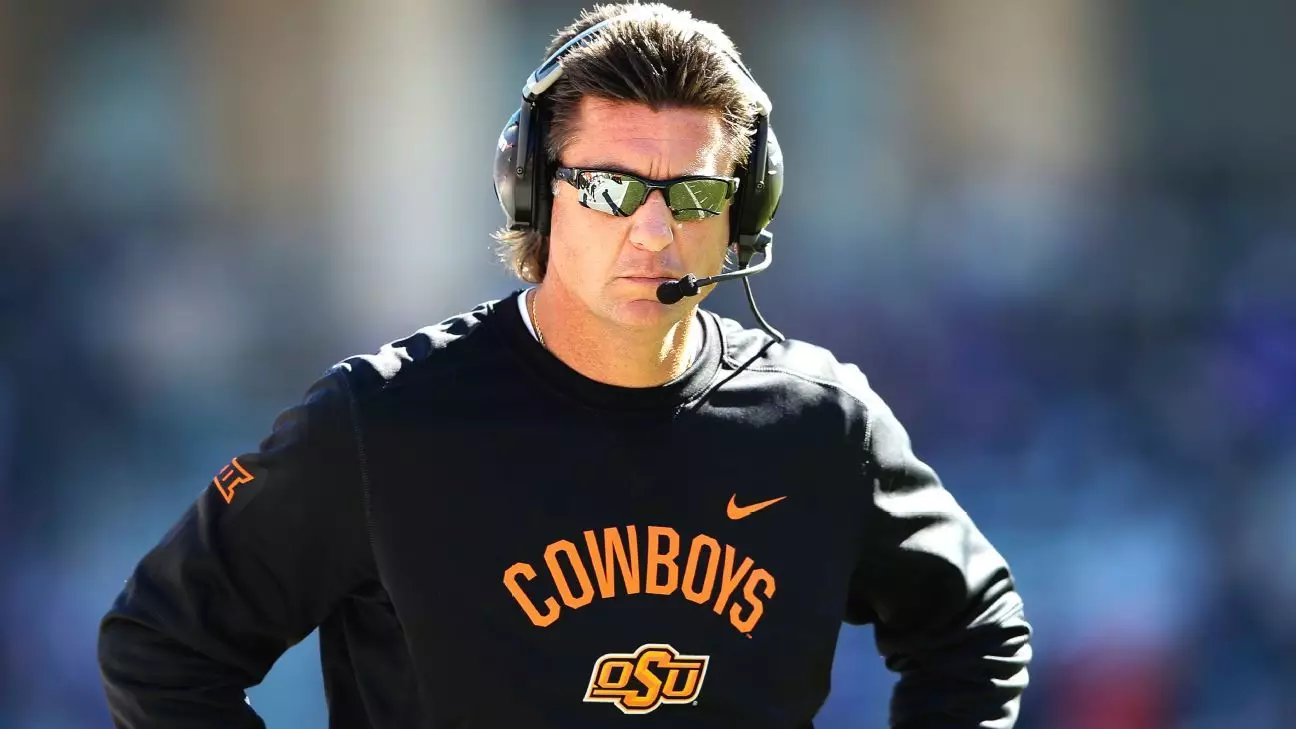In a significant development for Oklahoma State football, head coach Mike Gundy has successfully negotiated a restructured contract that will keep him at the helm of the Cowboys. The decision emerged after extensive discussions between Gundy and university officials, coinciding with a special meeting held by the Oklahoma A&M board of regents. Although the meeting did not yield immediate resolutions, it ultimately facilitated the realignment of Gundy’s contract amid growing concerns regarding the performance and direction of the football program.
This restructuring is vital not only for Gundy’s future but also for the broader context of college athletics, where financial considerations often clash with performance metrics. In this instance, the adaptation of Gundy’s contract reflects an evolving landscape that calls for revenue sharing with players, a concept gaining traction across various college programs. The decision to redistribute Gundy’s substantial $7.75 million salary indicates a commitment to prioritize player welfare, especially in light of the recent discussions regarding player compensations.
One of the central elements of Gundy’s contract renegotiation involves a notable reduction in his salary and a decrease in his buyout figure. Initially, if Oklahoma State had opted to terminate Gundy’s contract without cause, the university would have faced a staggering buyout of $25.3 million. However, the renegotiation appears to signify a shift toward a more manageable and performance-oriented contract structure. Gundy’s willingness to forego a portion of his salary for the sake of his players demonstrates a responsive leadership approach, albeit not without its struggles to find common ground on the specific terms.
This situation is particularly revealing of the tension that can exist within collegiate athletic departments, where the line between coach autonomy and university governance can blur. While Gundy commands respect for being Oklahoma State’s all-time winningest coach, the recent performance decline leading to a dismal record of 3-9 has prompted scrutiny from university officials and regents alike. Such scrutiny underscores the pressures that coaches face to produce results while simultaneously navigating the complexities of institutional philosophy and student-athlete well-being.
Despite his historical achievements, including the 2011 Big 12 title and an impressive track record of bowl appearances, the recent challenges cannot be overlooked. Ending the season with a humiliating 52-0 defeat at Colorado serves as a sobering reflection of the current state of the program. Gundy’s decisions, including the firing of key offensive and defensive coordinators, signal an urgent need for change within the coaching staff framework. However, these moves also amplify the stakes surrounding Gundy’s leadership. As he reaches out to potential replacements, the question remains whether these changes will translate into improved performance on the field.
Moreover, the ongoing tension between Gundy and the board indicates a potential shift in expectations. The discussions surrounding the requirement for greater oversight of assistant coach hiring suggest a desire for more accountability and oversight from the university administration. Such a dynamic highlights the complexity at play; while Gundy is a celebrated figure with a storied history at Oklahoma State, the recent slip in performance has reignited conversations about the sustainability of his tenure.
As Gundy enters this new phase of his coaching career, questions linger about the balance between tradition, innovation, and accountability in college football. The commitment to adjust his salary indicates willingness on both sides to adapt in a rapidly changing athletic environment, striving not only for the success of the team but also enhancing the overall student-athlete experience.
The forthcoming season thus represents a critical juncture for Gundy as he aims to rally his coaching staff and inspire his players. With the support of university leadership, Gundy must harness both his experience and the fresh opportunities presented by this contract restructuring to revitalize Oklahoma State football. Ultimately, the decision to retain him provides a pathway for growth and adaptation in a college football landscape increasingly defined by competitive performance, player well-being, and institutional integrity. As the Cowboys gear up for their next season, all eyes will be on Gundy and his ability to steer the program back toward the heights it once navigated.


Leave a Reply